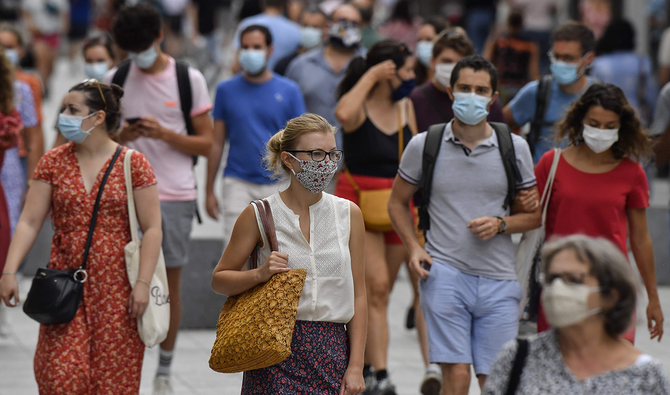
- ARAB NEWS
- 05 Jul 2025

Since the onset of the coronavirus pandemic, economists and market analysts have been debating the shape of the recovery from the savage recession brought on by economic lockdowns and travel restrictions.
Will it be V-shaped — a sharp bounce back from a rapid descent? Or will it be W-shaped — a short recovery followed by another downturn as lockdowns are reimposed? Some have suggested a “swoosh-shaped” model, where a fall is followed by the classic rising curve of the Nike logo.
The latest shape to attract the attention of theoreticians is the letter K. In this scenario, a vertical decline — as equity and oil markets suffered in March and April — is succeeded by not one, but two recovery patterns, one sharply up and one sharply down.
Looking at global economies, you can see what they mean. In the US, equity markets have recovered so fast that they have reached all-time highs, with the S&P 500 index getting back all the losses of March and more. That represents the upward tick of the K.
But plenty of other indicators are heading the opposite way. Economic output as measured by gross domestic product (GDP) is still down, employment is rising, and bankruptcies and indebtedness statistics are all heading the other way. That’s the downturn leg of the K.
These features are inevitably highly US-centric, though it is worth noting that the Chinese economy is behaving more like a V-shape. The sharp economic downturn of March and the draconian measures brought in to counter it have had a significant effect. China is one of the few global economies forecast to have positive GDP growth this year, and Chinese stock markets are, like the S&P, above pre-pandemic levels.
In the US, the picture is complicated by the fact that only certain parts of the stock market are enjoying the K uptick. The S&P 500 is supposed to be a broad measure of the health of corporate America, but in fact only a limited number of companies can be regarded as in good health, as defined by share prices.
The US market is dominated by technology companies like Apple, Alphabet (owner of Google) and Amazon that have, so far, had a very good crisis. Apple recently became only the second company in history to hit a market capitalization of more than $2 trillion, after Saudi Aramco did the same in the days following its IPO last year.
With Microsoft and Facebook added, the high-tech “big five” of US stock markets account for a quarter of the rise in markets since the March crash.
But because the tech giants are so big, they skew the real performance of US stock indices. An analysis recently showed that the value of nearly a quarter of all S&P constituents was more than halved from all-time highs; the average stock on US markets, excluding the tech giants, is down nearly 30 percent from its best.
As long as the S&P index headline is rising, the bulls, led by US President Donald Trump, can claim that the recession is not so bad after all. But such bravado hides the fact that below the surface many corporates are suffering badly, and are increasingly testing financial limits as the economic effects of the pandemic continue.
In Arabian Gulf markets, the situation is further complicated by the oil factor. Even those that do not rely on energy companies — like Dubai — derive benefit from high oil prices, which stimulate economic activity and enable government spending.
The shape of market recovery in the region does not fit in with any of the letter models, V, W or K. Markets took a hammering in March and April, and — unlike US indices — have not regained the highs of pre-pandemic days. Perhaps only a sustained recovery in the oil price will get them back there.
One outlier, in a positive way, should be noted. Despite the oil market carnage, Saudi Aramco shares are almost back to the highs of the immediate post-IPO days. Measured against its peers among the quoted oil companies, Aramco has had a much better crisis than any.
• Frank Kane is an award-winning business journalist based in Dubai. Twitter: @frankkanedubai